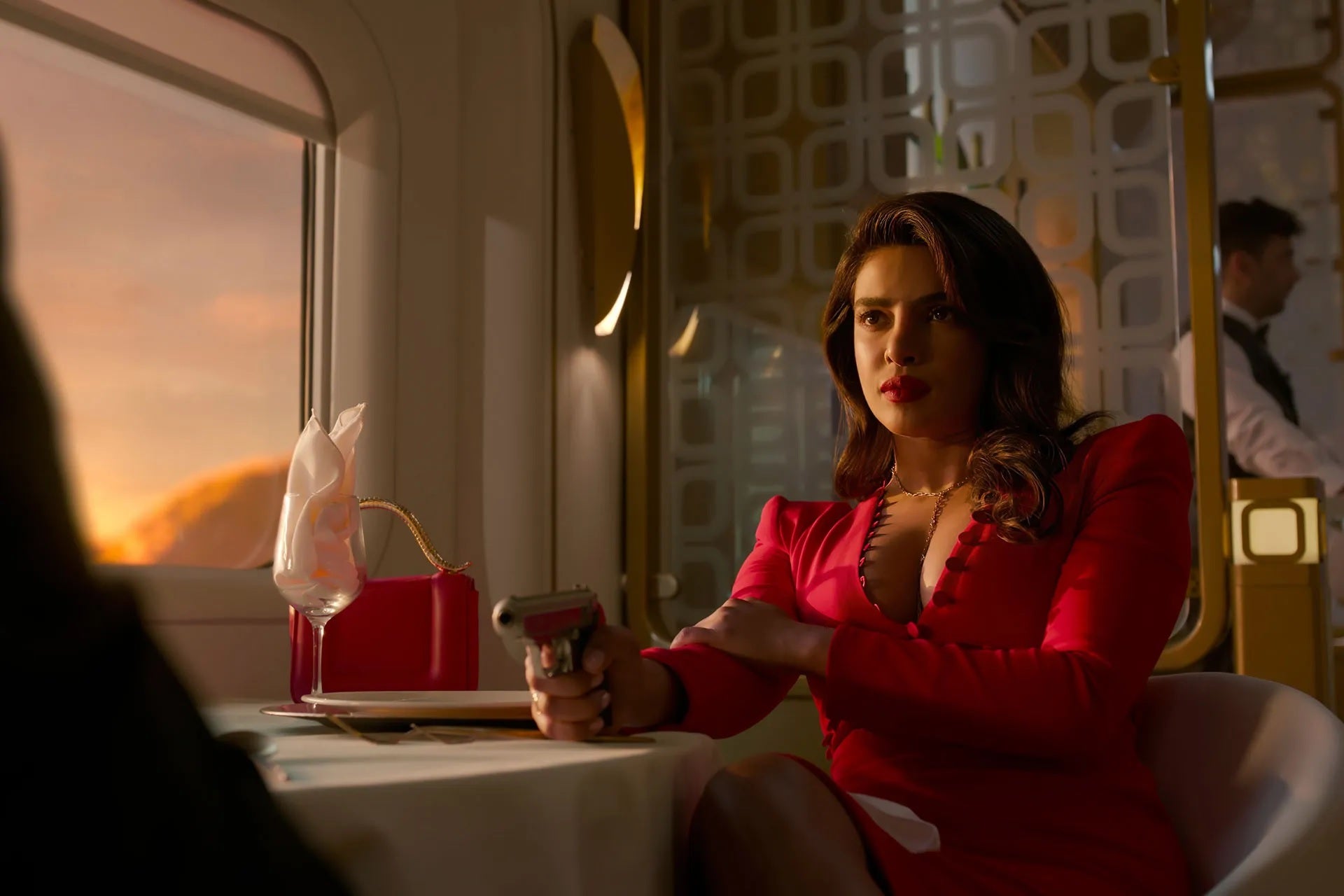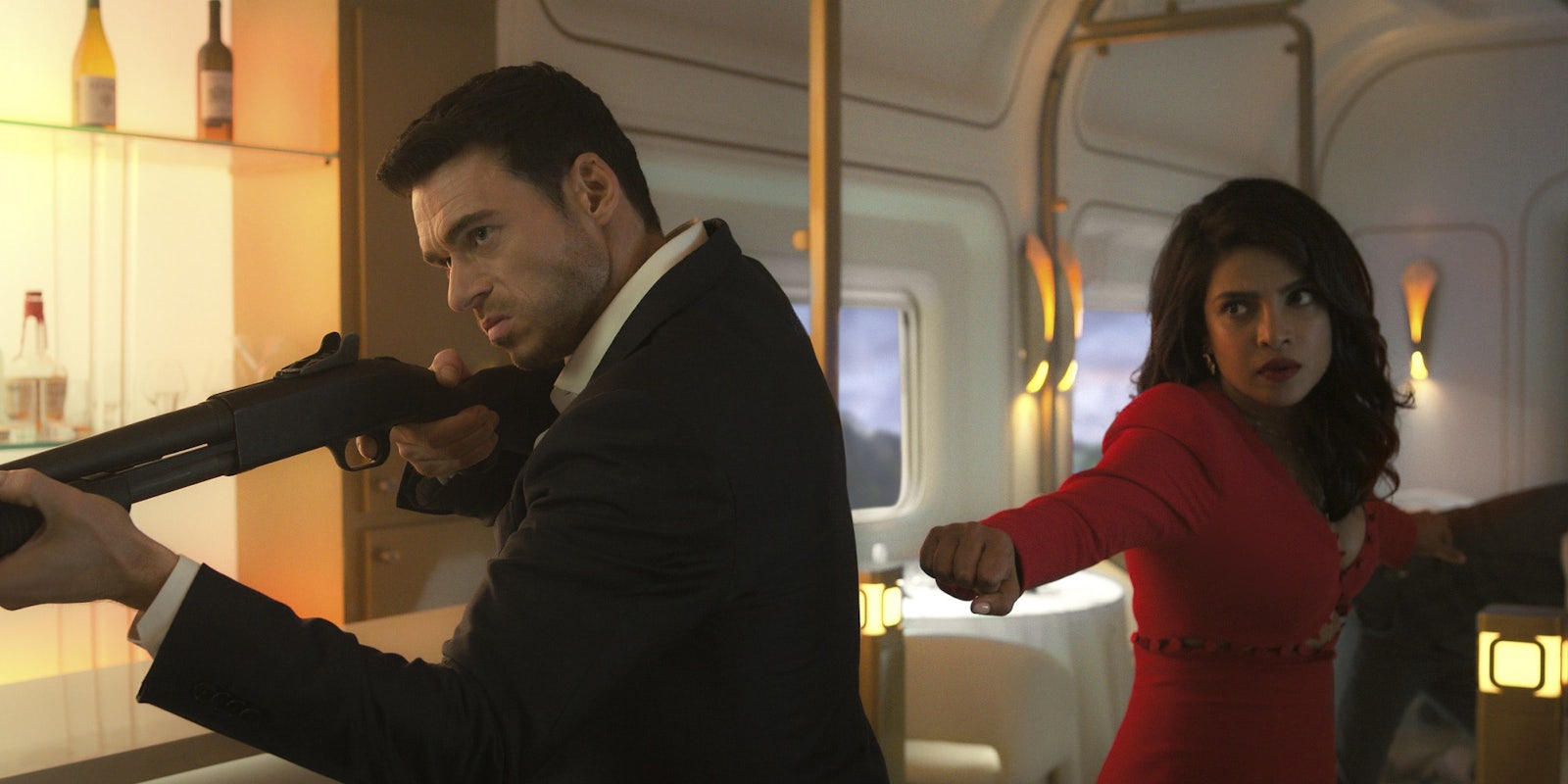This review is spoiler-free.
In their post-Marvel career, the Russo brothers’ primary achievement is extracting vast production budgets from streaming services. Following their (terrible!) $250-million Netflix movie The Gray Man, their new Amazon miniseries Citadel clocked in at almost $300 million. A baffling number when you see how cheap it looks onscreen—although that’s far from the only problem.

Showrunner: David Weil
Streaming: Amazon Prime Video
Dull, derivative and aesthetically unpleasant, this generic thriller desperately tries to copy hits like ‘The Bourne Identity,’ casting Richard Madden and Priyanka Chopra Jonas as a pair of amnesiac spies.
In theory, this miniseries should offer blockbuster production values, launching a franchise of international spinoffs for Amazon. As with other Russo projects (although here they’re exec producers instead of directors), there’s an obvious hope that they’ll repeat their Avengers success.
In practice, Citadel is a Bourne Identity/Mission Impossible ripoff with hamfisted writing and a visibly low-rent aesthetic. Viewed through a fog of grey/bronze color-correction, its action scenes are bland and its locations forgettable, offering no directorial eye for building tension. On every level, Citadel is impossible to take seriously.
The show’s premise is silly but perfectly acceptable for a lightweight action thriller: Mason Kane (Richard Madden) and Nadia Sinh (Priyanka Chopra Jonas) are a pair of spies who work for an organization named Citadel, and lose their memories after a mission goes wrong. Eight years later, Mason has built a quiet life as a husband and father, unaware of his violent past until he reconnects with Citadel tech guy Bernard (Stanley Tucci).
As someone who enjoys Bond movies, Mission Impossibles, and tropey TV shows like the heist dramedy Leverage, I’m happy to embrace corny worldbuilding in the name of entertaining action and espionage hijinks. However, Citadel fails to deliver on either count—and seems bafflingly disinterested in the central idea of an amnesiac hero.

Amnesia stories are all about uncovering the mystery of a character’s past, and tackling how they integrate those revelations into their new identity. But this show barely explores who Mason Kane is as a person. In flashbacks, he’s a cocky action hero. In the present day… he’s just some guy.
We know nothing about the dynamics of Mason’s marriage. His daughter is a narrative accessory. Do he and his wife have careers or friends? How do they afford such a big house? No idea. In the three episodes made available for review, we receive similarly little insight into Nadia.
Amazon has previously found success with generic action thrillers (Reacher, Jack Ryan), but Citadel is so reliant on derivative, unadorned genre tropes that it feels like a spy parody with all the jokes removed. Take the intro scene for episode 1, where Nadia and Mason go undercover on a train, tasked with finding a guy with a dangerous MacGuffin.
Nadia wears a sexy red dress and flirts with their target. Mason fights a man in a bathroom. At one point he and Nadia have a conversation in like five different languages and then kiss, even though they’re undercover as strangers in a public setting. It’s basically a collage of spy movie clichés, presented with no humor and no consideration for whether they actually make sense in context.

Working from a script that sounds like it was generated by ChatGPT, these characters are so basic that the scene becomes perversely confusing. Like… are they meant to be this obvious while “spying” on a crowded train? Is there going to be some kind of Inception-style twist where we learn that none of this is real? (No, BTW.)
We’re also introduced to Citadel‘s favorite expository device: A character sitting down and just explaining who they are and what they’re doing. You’d expect spies (a famously duplicitous bunch!) to communicate with a little more elegance, but apparently not. And that’s before we get into the issue of production values, which in this scene resembles a TV commercial.
After one of the worst pilot episodes I’ve seen in years, Citadel improves a little in episodes 2 and 3, setting up some mildly interesting twists. To be clear though, this show is only six episodes long, and at the halfway point it still hasn’t justified its own existence. Despite being aimed at adults, Citadel’s plot and dialogue are more G.I. Joe than Bourne Identity—a deceptively smart and well-observed thriller that Citadel’s creators seem desperate to copy.
The spy missions in Citadel are cartoonish stuff like “steal a Very Special Briefcase” and “stop the Bad Guys unleashing a plague.” We accept this material in glossy blockbusters because it provides a framework for hot people to drive fast cars and shoot at each other. But Citadel is surprisingly low on action. There are a couple of unmemorable fight scenes per episode, but far more screentime goes to people talking in poorly-lit rooms—always written with groan-worthy simplicity.
To tell a story about memory loss and secret agents, the main characters need to seem at least nominally intelligent. Joss Whedon’s second-rate sci-fi show Dollhouse comes to mind. In Citadel, however, the writers don’t seem familiar with basic spycraft or the concept of psychological manipulation. Above all, this show isn’t fun. On the rare occasions when someone delivers a slightly funny line, it comes as a surprise.
Under normal circumstances, TV budgets are an inside-baseball issue, irrelevant to the viewer experience. But I keep coming back to that $300-million price tag because Citadel was presumably greenlit—along with a franchise of spinoffs!—on the image of the Russo brothers as hitmakers.
With the Russos as exec producers, Josh Appelbaum and André Nemec (Mission Impossible—Ghost Protocol) were the original showrunners, replaced by writer David Weil (Amazon’s Hunters) after they disagreed with the Russos over an early cut of the show. This led to months of reshoots, causing the budget to balloon. We obviously don’t know what that original cut was like, but the final product is a damning look at Amazon’s standards for a so-called “event” series. It’s an action thriller with poor action; a spy drama with dull characters and a threadbare script. A prestige series that looks ugly and makes little use of its charismatic stars. A fiasco.



